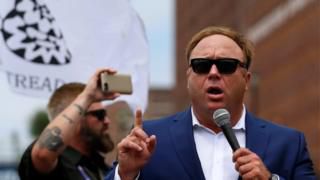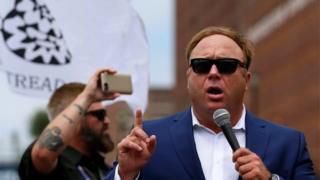
 Image copyright
Image copyrightReuters
Image caption
InfoWars' Alex Jones has pushed the idea that some of America's most awful tragedies were fabrications
To an audience of more than two million, Alex Jones uses Facebook to push some of the most dangerous conspiracy theories in American discourse.
His InfoWars outlet - you can't in good faith call it news - has called the Sandy Hook massacre a hoax (it wasn't). It said Parkland survivors were crisis actors (they weren't). It claimed a pizza restaurant in Washington DC was the headquarters of a paedophilia ring (it wasn't).
Democrats, InfoWars told viewers on Independence Day, are about to declare civil war (they're not).
On Tuesday, Facebook was asked by Congress why it continued to allow InfoWars to use its platform.
"If they posted sufficient content that it violated our threshold, the page would come down," said Monika Bickert, Facebook's head of policy.
"That threshold varies depending on the severity of different types of violations."
Facebook moderators 'keep child abuse online'Facebook will not remove fake news
Earlier in the hearing Ms Bickert said Facebook had a three-strikes policy for inappropriate behaviour. You simply must wonder what it would take for Facebook to consider something a strike against InfoWars. Ms Bickert wouldn't be drawn on anymore details of the "threshold".
Tuesday's hearing was called by Republicans who accuse the site of disproportionately silencing conservative views. What limited data we have on the issue suggests otherwise - one study published just this week suggests right-leaning pages on Facebook have a greater presence than those on the left (though the source of the study quite openly says it is pushing the views of "progressives").
There might be one very simple explanation as to why Facebook is acting in this manner - and that's fear.
Image copyright
Getty Images
Image caption
(L-R) Facebook's Monika Bickert, Juniper Downs, of YouTube, and Nick Pickles, senior strategist at Twitter
Facebook is tremendously worried about being seen as anti-right. In a Republican-controlled Congress, it could mean it faces greater controls on its business.
It has taken several steps to address the issue - its independent advisers are made up of both sides of the US political spectrum, a chasm that gets wider every day. As the company said on Tuesday, in our divided world it's perhaps impossible to put together a fact-checking operation that is considered by all to be non-partisan. That said, Facebook is apparently trying.
Yet the result of Facebook's efforts has led to bizarre meetings in which outlets with little-to-no journalistic standards are being consulted alongside publications with a long record of accountability and accuracy.
No publication is infallible, but no serious observer could consider the New York Times in the same bracket as the Daily Caller. And yet Facebook calls upon them both, apparently equally, to help shape policy.
Facebook is currently in the middle of an advertising campaign, both on its platform and with billboards, declaring "fake news is not your friend".

Media playback is unsupported on your device
Media captionFacebook says it's up to parents to ask for posts to be removed, Nicci Astin tells Today
The company is doing what it can to reduce the reputation damage caused by Russian manipulation of its service. But it can be said that values don't truly exist until they are tested.
And at Tuesday's hearing, we learnt fake news still has a place on Facebook.
"We don't have a policy of removing fake news," Ms Bickert said, echoing a position the company stated last week when it argued, that fake news to one person might just be opinion and analysis to another.
That's true in some instances, sure. But claiming, as Alex Jones did in 2015, that contaminated water is "making the friggin' frogs gay" isn't offering a different opinion - it's offering a different reality.
Facebook has for now decided this is all above board. InfoWars has not had its three strikes.
Facebook will, though, hinder the distribution of material deemed to be fake, if so judged by its fact-checking groups.
But that's a limited measure - the content is of course still there. And when much of Alex Jones' work goes out live - thanks to Facebook's streaming platform, naturally - it's difficult to see how fact checkers could retrospectively limit its spread or impact.
Facebook scandal- Who is selling your personal data?Facebook is worried that banning InfoWars would provide fuel to the fire that it silences right-wing voices. It's not wrong - it would create outrage in some quarters. But for how long?
The social media platform has helped create a lightning-fast news agenda that moves on at an alarming pace. The dramatic stock price hit it suffered in the wake of its biggest crisis, the Cambridge Analytica scandal, has been wiped out.
This too would pass - pretty quickly, I'd wager. More damaging, long-term, will be Facebook's failure to take the scourge of fake news seriously.
The site will of course be accused of removing all doubt they are liberal Silicon Valley elites intent on censorship - but let's be real here, that accusation will be made no matter how it behaves.
Members of Congress may well take issue, but if they want to come out and take on Facebook, it'll mean defending Alex Jones and his message. Defending the idea that some of America's most awful tragedies were fabrications.
If elected politicians believe that, Facebook would perhaps be doing the American people a service by making them say so in public.
Source link
Read the full article

